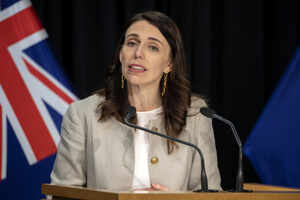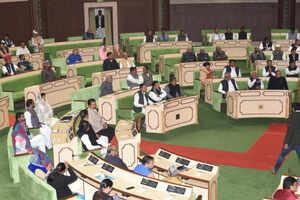30 years and more: Such a long journey for mercy

Banwarilal Purohit and Fathima Beevi, governors of Tamil Nadu 16 years apart, have one thing in common. They have taken their power of pardon too seriously, without adhering to the law. The mercy plea of Rajiv Gandhi assassination convicts have been presented before them and both have disregarded it.
A few weeks ago, when T Arputham, mother of A G Perarivalan filed a case for parole, the court on noting the inordinate delay observed: “The governor of TN, a constitutional authority, cannot sit on the state’s recommendation on release of all seven life convicts in the Rajiv Gandhi assassination case for so long”.
The situation was similar to 1999, when Nalini Sriharan, Murugan, Perarivalan and Santhan submitted mercy petitions to the governor of Tamil Nadu (Fathima Beevi) for grant of reprieve from the death sentence confirmed by the Supreme Court and the same were dismissed by her. Without taking advice of the state cabinet she wrote: “having gone through the records, no case made out, hence dismissed”. All four prisoners moved the high court on the ground that the governor cannot pass orders on mercy petitions under Article 161 without advice being tendered by the cabinet.
NEWS IN
BRIEF
Your one-minute Citynews catch up

Speaker Nancy Pelosi said Sunday she is calling the House back into session this week to vote on a bill prohibiting the US Postal Service from implementing any changes to operations or level of service. The action comes amid growing concerns that the Trump White House is trying to undermine the agency during the coronavirus pandemic while states expand mail-in voting options.

Prime Minister Jacinda Ardern on Monday chose to delay New Zealand’s national elections by four weeks as the country deals with a new coronavirus outbreak in its largest city, Auckland. The election had been scheduled for Sept. 19 but will now be held on Oct. 17. Under New Zealand law, Ardern had the option of delaying the election for up to about two months.

To adapt to the new normal of physical distancing necessitated by coronavirus, the Lok Sabha and Rajya Sabha will also see staggered sitting arrangements and audio-visual connectivity across both the chambers to allow members to participate in the proceedings from where they are seated, in either of the two chambers or galleries.

While the rate of increase in Covid-19 new cases and deaths seems to be slowing down, the surge in new cases and fatalities last week (Aug 10-16) made it the deadliest yet in India. Covid-19 cases grew by a little over 4.3 lakh during the week at a rate of 5.9% significantly lower than the 10.9% growth in the previous week. This week reported 6,555 fatalities, a rise of 4.4%.

Fewer patients are dying in India from Covid-19 compared to the rest of the world as the fatality rate continues to decline, touching 1.93%, the health ministry said even as deaths due to the disease have crossed 50,000. The ministry said that the USA crossed 50,000 deaths in 23 days, Brazil in 95 days and Mexico in 141 days. India took 156 days to reach this national figure.

A crucial new Army post, the operational need for which came to the fore during the 73-day troop confrontation at Doklam with China in 2017, is still missing in action due to bureaucratic hurdles. Sources on Sunday said objections by the defence ministry’s finance wing have slowed down the approval process for the post of Deputy Chief of Army Staff (Strategy) or DCOAS (S).
The Madras high court quashed the governor’s order and observed: “The procedure of getting advice from the council of ministers by the first respondent before passing the impugned order under Article 161 of the Constitution is not followed and also as decided in the above said cases by the apex court, the impugned order is not valid in law, and it cannot be sustained.” The court followed Maru Ram’s case (1980) wherein it was held that the state government can advise the governor who is bound to take it. The matter then went to Karunanidhi’s cabinet, to seek due counsel, and only the reprieve for Nalini was recommended in 2000. The others went before the President which was dismissed after a delay of 11 years.
When the others filed cases before the Madras high court, they were transferred to the Supreme Court. In 2014, taking exception to the delay the SC observed: “We implore upon the government to render its advice to the President within a reasonable time so that the President is in a position to arrive at a decision at the earliest”. The Supreme Court also directed: “In the cases of V Sriharan alias Murugan, T Suthendraraja alias Santhan and A G Perarivalan alias Arivu, we commute their death sentence into imprisonment for life”.
On February 19, 2014, the Tamil Nadu cabinet advised the governor to grant reprieve to all seven accused. The Union government filed a petition and got the cases transferred to SC. The constitution bench to which the cases were listed opined that a life sentence means the rest of the life, but they can apply for remission under Section 432 of the CrPC. This will apply to cases where death sentences are converted into life and any reprieve sought for the same may be considered reasonably.
Once again all of them applied for remission with the governor. The state cabinet also advised the governor to grant pardon in September 2018. As there was no response, Nalini moved the court. The Madras high court declined to give any direction and held that the governor was insulated from being questioned. Here, the court failed to note SC decision in the Swaran Singh case (1998), wherein it was observed that “we cannot accept the rigid contention of the learned counsel for the third respondent that this court has no power to touch the order passed by the governor under Article 161 of the Constitution. If such power was exercised arbitrarily, mala fide or in absolute disregard of the finer canons of constitutionalism, the by-product order cannot get the approval of law and in such cases, the judicial hand must be stretched to it”.
Last month the matter was in court again and it was informed that this time the delay was because the present governor is awaiting the final report of the CBI’s Multi-Disciplinary Monitoring Agency (MDMA). The MDMA, set up in 1998 on the recommendation of Justice M C Jain Commission of Inquiry which probed the conspiracy aspect of Rajiv Gandhi’s assassination, had come in for criticism by the SC in January 2018 as the court observed the agency did not appear to have achieved “much headway”. Assuming its final report will contain adverse material to the seven accused, the question of reopening the case against them will not arise as they had been convicted for murder and conspiracy under Section 120-B IPC and it will violate Article 20(2) of the Constitution that guarantees that no person can be prosecuted and punished for the same offence more than once.
It is open to the governor to take note of material before him and also to make enquiries as considered necessary (Epuru Sudhakar case, 2006), but such a question does not arise here. Considering they have been incarcerated for more than 30 years, and the cabinet giving the same advice more than once, the governor cannot postpone his decision without reason. It’s high time the courts step in and show the rule book to the governor who is intending to follow his predecessor in 1999.
